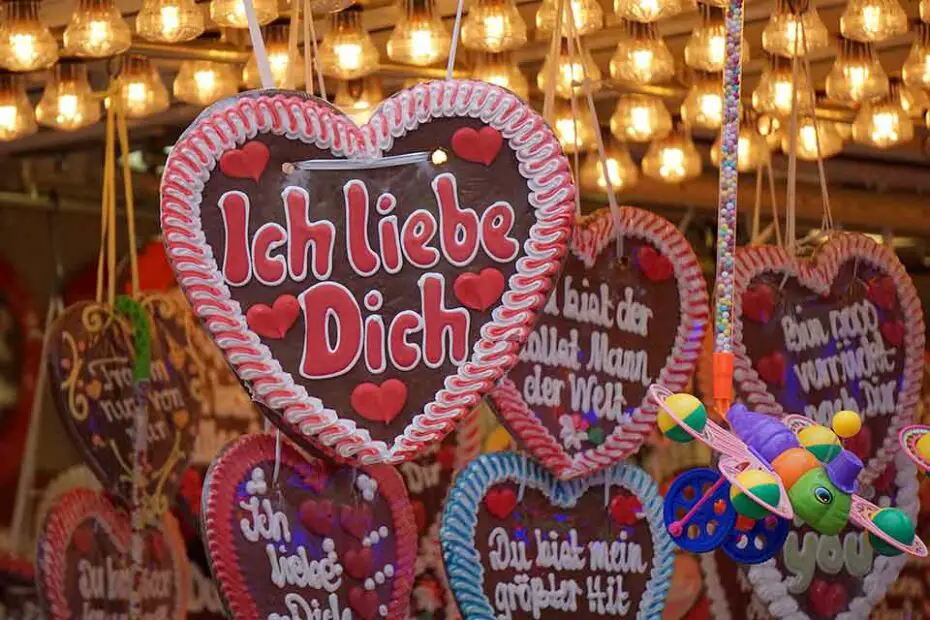When you found that special person, you are excited. You feel butterflies in your stomach, you miss your darling when you are separated and you are over the moon once you are back together.
And of course you want to express your feelings and let the other one know how you feel.
Expressing our feelings the right way can be difficult enough in our native tongue. But doing it in a second language is even more difficult.
But doing so is very romantic and your partner will certainly appreciate the effort. Addressing someone in his own language shows your respect of his origin and his bonds to his home country.
So let’s have a look at romantic phrases in German.
How to say I love you in German to a Man
In the German language every noun has a specific gender. It can be male, female or neuter. This can be difficult for English speakers, as articles change depending on the gender of the noun. For example it’s “der Mond” (male, the moon”, but “die Sonne” (female, the sun). Consequentially the man is “der Mann” (male) and the woman translates to “die Frau” (female).
A child can be neuter (das Kind, the child), male as in “der Junge” (the boy) or female as in “das Mädchen” (the girl). No, wait! “Das Mädchen” is actually neuter. Yes, you are right. It’s not logical and it’s confusing. But other than computer languages, human languages don’t always adhere to strict logic. So in many instances, you simply have to learn these peculiarities and keep them in mind.
Luckily when it comes to expressions of love, most expressions are the same whether you address a woman or a man. All of the following examples can be applied to men as women alike. So let’s take a look at various ways how to say I love you in German to a man (or woman).
Ich liebe dich
The direct translation of “I love you” and the most common expression in German as well as in English. These three little words say it all and we all love to hear them.
But also the strongest expression in both languages alike. So not something you should say lightheartedly, but only when you really mean it.
Ich liebe dich auch
Meaning “I love you too”. Used as a response to the above. It’s often shortened to “Ich dich auch!”

Ich hab dich lieb
Roughly the equivalent of “I am very fond of you.” Can be used when someone is really dear to you, but “Ich liebe dich” / “I love you” would be a bit too strong. It’s less romantic than the above, so is often used for relatives. For example you might say this to a child or your grandma.
Ich mag dich
Translation of “I like you.” You can use it to tell someone you are really fond of him (or her). A stronger form would be “Ich mag dich sehr!” (I am very fond of you!)
Du bist mein ein und alles
The literal translation is “You are my one and everything.”, equal to “you mean the world to me.”
Willst du mit mir gehen?
“Do you want to go with me”, in the sense of “do you want to be my boyfriend?” Can be used for girls as well. In either case, it’s a bit old-fashioned and has been used more often by teenagers than by grown-ups.
Willst du bei mir einziehen? or
Willst du mit mir zusammenziehen?
Both forms mean “do you want to move in with me?” The first would be used when you are asking a guy to move into your existing apartment. The second form is more open. You might move into one of your flats together or you could start searching for a new and probably bigger place and then move in together.
Either way a good start to find out if you are both compatible and can live together. Definitely recommended before the next step:
Willst du mich heiraten?
Do you want to marry me? The ultimate question, so to speak.
You’ve been through first romance, cohabitation, common holidays, and may have had some rough patches as well. And you still love your partner and want to spend the rest of your life with him? Congratulations!
Whether you deem a marriage necessary or not may depend on your heritage, your country’s customs, legislation or personal preference. The main thing is you have found your ideal partner. And if you want to show your bonds to the world (and each other), a marriage is certainly a great way to do so. Plus, it’s a reason to celebrate and have a big party! And who doesn’t like that? More champagne? Yes, thank you!
So, now you know how to say I love you in German to a man (or woman). And in case you are wondering what the hearts in the picture at the top are, here’s the explanation:
Lebkuchenherzen
They are Lebkuchenherzen, so hearts made of gingerbread dough. Traditionally they were sold on German Christmas markets, especially in Bavaria in southern Germany. But they became so popular that they are now sold on any fun fair all over the country. And all year round.
And they certainly are the most delicious way to say I love you in German to a man or woman!




